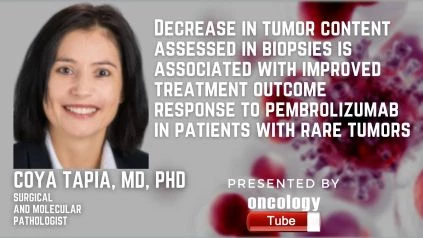Coya Tapia, MD, Ph.D., Surgical and Molecular Pathologist speaks about Decrease in tumor content assessed in biopsies is associated with improved treatment outcome response to pembrolizumab in patients with rare tumors.
Link to Abstract:
https://jitc.bmj.com/content/8/1/e000665.long
Synopsis:
Background: After neoadjuvant treatment, decreased tumor content (TC) in resection specimens is used to assess prognosis. We looked at whether TC measured in biopsy specimens or the change in TC from baseline to treatment can be used to predict reaction in pembrolizumab-treated patients with rare tumors.
Methods: A total of 57 tumors (representing 173 baseline and 179 on-treatment biopsies) were analyzed from 57 patients with unusual tumors who were enrolled in phase II clinical trials of pembrolizumab. On H&E-stained slides, TC was calculated, and tumors were divided into low and large TC groups based on a 10% cut-off. On-treatment biopsies were examined for necrosis, proliferative fibrosis (PF), and natural tissue. The change in TC from baseline to on-treatment, as well as the change in TC from baseline to on-treatment, were all linked to clinical response as measured by the Response Evaluation Criteria in Solid Tumors.
Results: 14 percent (n=8) had a decline in TC, 75 percent (n=43) had no difference in TC, and 11 percent (n=6) had a rise in TC from baseline to on-treatment. In comparison to no change/increase in TC (6 percent, 3/49), the objective reaction was substantially correlated with a decline in TC from baseline to on-treatment (38 percent, 3/8) (p=0.031). Patients with a reduction in TC (75 percent probability) have a slightly longer time to progression (TTP) than patients with a rise (20 percent probability) or no difference in TC (19 percent probability) (p=0.0042). Low TC was seen in 23% (13/57) of the tumors at baseline and 26% (15/57) of the tumors after surgery. At baseline, 77 percent (44/57) of tumors had high TC, and 74 percent (42/57) had it after surgery. In on-treatment biopsies, there were no major correlations between necrosis, PF, or normal tissue and reaction.
Conclusion: Patients with a lower TC showed a substantial increase in objective response and a longer TTP from baseline to on-treatment. Our findings indicate that the change in TC may be used to predict pembrolizumab reaction in unusual tumors. However, further research in larger populations is required to ascertain the therapeutic importance of TC, as well as the change in TC and the 10% cut-off in biopsies.
NCT02721732 is the number assigned to this report.

